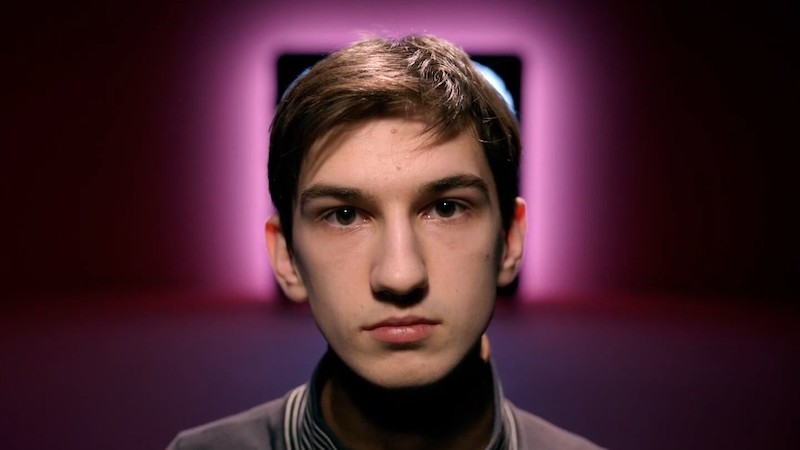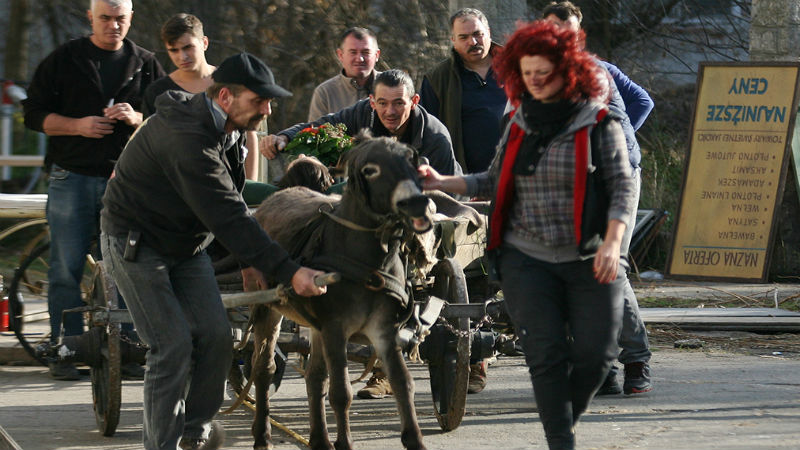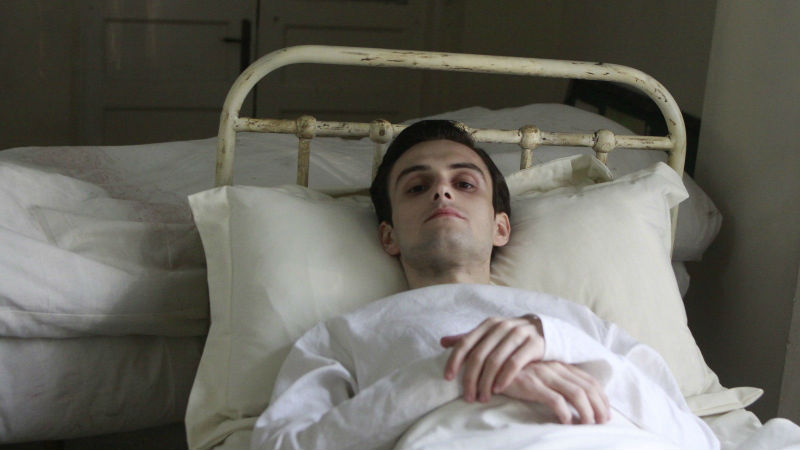With a title as long as this and a duration of nearly three hours (163 minutes), Radu Jude deliberately sets out to challenge and alienate his viewers. Do not Expect too Much from the End of the World is both narratively and aesthetically fragmented, with manifold languages and textures overlapping and abruptly combined in order to create a colourful and rough patchwork of cinematic references. It is tiring and monotonous, and indeed difficult to watch, however not without some remarkable achievements.
It will take you a good 20 minutes before you join the pieces and begin to follow the narrative thread. Angela (Ilinca Manolache) is a sequin-clad, blonde and scrawny production assistant hired by multinational business in order to elicit statements that suit their narrative from victims of workplace accidents. Her job is underpaid and unfulfilling. Instead, Angela seeks thrills in social media. She has a TikTok alter-ego called Bobita, a super racist, sexist, Putin-loving and vulgar man who boasts his connection to Andrew Tate (incidentally, the British influencer currently lives and is under arrest in Romania). Bobita is as repulsive as the real-life ultra-misogynist, aided by the bizarre filter that turns Angela into a bald man with super-thick eyebrows. A real vision from hell.
Most of the film is in grainy black and white, except for what’s captured by a different media (such as Angela’s phone, or a 4k/8k camera at work), and a strange collage of roadside crosses (devoted to those who lost their lives in road accidents). It’s as if the director was saying that metalanguage prevails over reality. We live in such a visually multilayered that the image captured by naked eye becomes banal and trivial. The jittery camera and the sudden cuts remind us that Jude wishes to freely experiment with these layers. To top it all up, Angela’s predicament is interspersed with clips from Romanian film Angela Moves On (Lucian Bratu, 1981) starring the veteran Dorina Lazar as a taxi driver who who becomes infatuated with one of her passengers. The “real-life” Angela incorporates a very similar affair into her life, namely inside her car. Fiction and reality establish a symbiotic relationship. Ultimately, Jude’s film is a mockery of the technical wizardry that constrains the world of cinema.
After numerous interviews and extensive internal meetings, Angela’s employersettles for wheelchair-bound Ovidiu (Ovidiu Pîrșan) as the subject of their workplace safety movie. He was in a comma for 13 months because he did not wear a helmet at work. They opt to conceal his foreign surname (because it has a dirty sexual connotation in Romanian), and also the fact that his employer too was negligent. That’s because they failed to provide lighting and to paint a car park barrier, which would have prevented the near-fatal accident. As usual, the blame lies with the victim. The capitalist world has sneaky ways of rewriting the narrative, and subverting dialectics. Angela’s Austrian boss Doris Goethe (Nina Hoss) travels to Romania is order to ensure that the promotional video delivers exactly what it should, without compromising the company’s reputation.
Do not Expect is a blundering movie movie with a crass sense of humour. Angela is particularly fond of crude jokes: “in the US a shop donates a bazooka to Ukraine for every rifle that people buy”, “a blind man walked to fish market and said ‘good morning girls’ to the people”, or a “God granted a man a wish and promised him that his neighbour would get twice what he asked, so the man asked God to pluck one of his eyes out”. German director Uwe Boll (playing himself) complains that film critics who constantly pan his movies, and argues that these horrible people (vile human being such as myself)should be subjected to violence (much like the characters in his films). Uwe is affectionately/infamously known as “the world’s worst filmmaker”. Andrew Tate, Uwe Boll: Jude wishes to celebrate the worst in mankind and in film alike.
The cherry on the cake comes in the final scene: a 30-minute static wide shot of Ovidiu being made to repeat the details of his accident ad infinitum, with his incredulous family standing right next to him. Angela and other crew members often step in front of the camera, in a shambolic effort to direct the poor man to his greatest strength. They have to grapple with a stubborn subject, temperamental equipment and unsavoury weather conditions alike. Ovidiu is finally given green cards to hold (to which they can add any text they wish in post-production). A fabulous mockery of the technical wizardry that defines and imprisons cinema and – more broadly – the visual media. The outcome is clumsy and awkward. Wilfully so. The only problem is that viewers have to wait more than two hours of repetitive action before reaching this dirty anti-climax, in a movie that indubitably overstays its welcome.
Do not Expect too Much from the End of the World premiered in the Official Competition of the 76th Locarno Film Festival, when this piece was originally written. The Romanian director won the Golden Bear two years ago with Bad Luck Banging or Loony Porn. The UK premiere takes place in October at the BFI London Folm Festival. It also shows at the 27th Tallinn Black Nights Film Festival, as part of the Best of Festivals section, and at the 41st Turin Film Festival. In cinemas on Friday, March 6th.











